When it comes to the dietary choices and household items that can impact our feline companions, the question of cinnamon's safety for cats often arises. As responsible pet owners, ensuring we are well-versed in the potential risks associated with common substances is essential for maintaining our cats' health.
In this article, we will explore the intricacies of how cinnamon interacts with a cat's system and the implications it can have on their well-being. Understanding the effects of cinnamon ingestion on cats is not only informative but also crucial for safeguarding our beloved pets.
Key Takeaways
- Cinnamon can be harmful to cats due to their inability to metabolize its compounds.
- Essential oils and concentrated forms of cinnamon pose a higher risk to cats.
- Signs of cinnamon toxicity in cats include weakness, vomiting, and diarrhea.
- Quick veterinary intervention is crucial if a cat ingests cinnamon to prevent complications.
Cinnamon Toxicity in Cats
Cinnamon toxicity in cats can pose serious health risks due to their inability to metabolize cinnamon compounds effectively. While cinnamon itself is not considered toxic by the ASPCA Animal Poison Control Center, cats lack the necessary liver enzyme to break down certain compounds present in cinnamon.
Coumarin, found in cinnamon, can act as a blood-thinner, impacting a cat's clotting ability when consumed in large amounts. Ingesting cinnamon may also lead to mouth irritation in cats.
It is crucial to be cautious with cinnamon products around cats, especially avoiding essential oils and concentrated forms. If you suspect your cat has ingested cinnamon or is showing signs of toxicity, prompt veterinary care is essential to prevent complications.
Metabolism of Cinnamon Compounds
Due to cats' lack of a specific liver enzyme required for metabolizing certain compounds found in cinnamon, their ability to process these substances effectively may be compromised. Cats metabolize cinnamon differently than humans, which can lead to potential issues when ingested.
Here are some key points to consider regarding the metabolism of cinnamon compounds in cats:
- Cats lack the liver enzyme necessary to break down certain components in cinnamon.
- This can result in slower processing of cinnamon compounds in a cat's system.
- The accumulation of these compounds without proper metabolism could potentially lead to adverse effects on a cat's health.
Risks of Cinnamon Ingestion
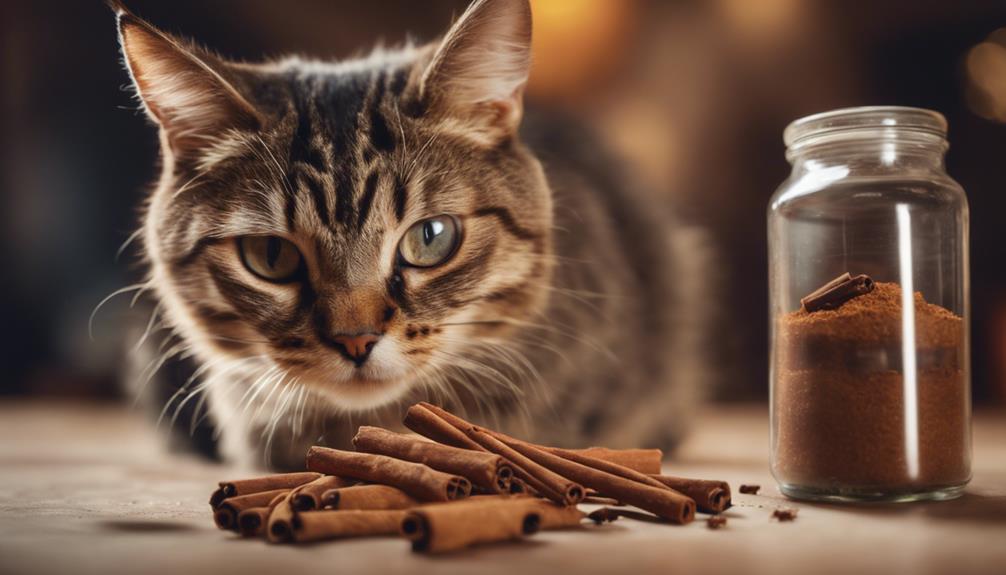
Ingesting excessive amounts of cinnamon can pose potential risks to a cat's health and well-being. While cinnamon is not toxic to cats according to the ASPCA Animal Poison Control Center, it contains coumarin, a blood-thinning compound that can affect clotting ability in large doses.
Cats may also experience mouth irritation from consuming cinnamon, especially in essential oil form or from chewing on cinnamon brooms. It's important to keep cinnamon sticks, plants, candles, and other products out of reach of cats to prevent accidental ingestion.
Being mindful of the risks associated with cinnamon and taking precautions can help ensure the safety and well-being of our feline companions.
Signs of Toxicity and Allergies
When considering the health implications of cinnamon exposure for cats, it is crucial to be aware of the signs indicating potential toxicity and allergic reactions in feline companions.
Signs of Toxicity and Allergies:
- Low blood sugar and liver damage can result from cinnamon toxicity.
- Symptoms of toxicity may manifest as weakness, vomiting, and diarrhea.
- Allergic reactions to cinnamon can lead to skin rashes, itchiness, hives, or scabbing of the skin.
It is vital to monitor cats for these signs if they have been exposed to cinnamon, ensuring prompt veterinary care if any concerning symptoms arise. Maintaining awareness of these indicators can help safeguard your cat's well-being when dealing with cinnamon.
Handling Cinnamon Ingestion
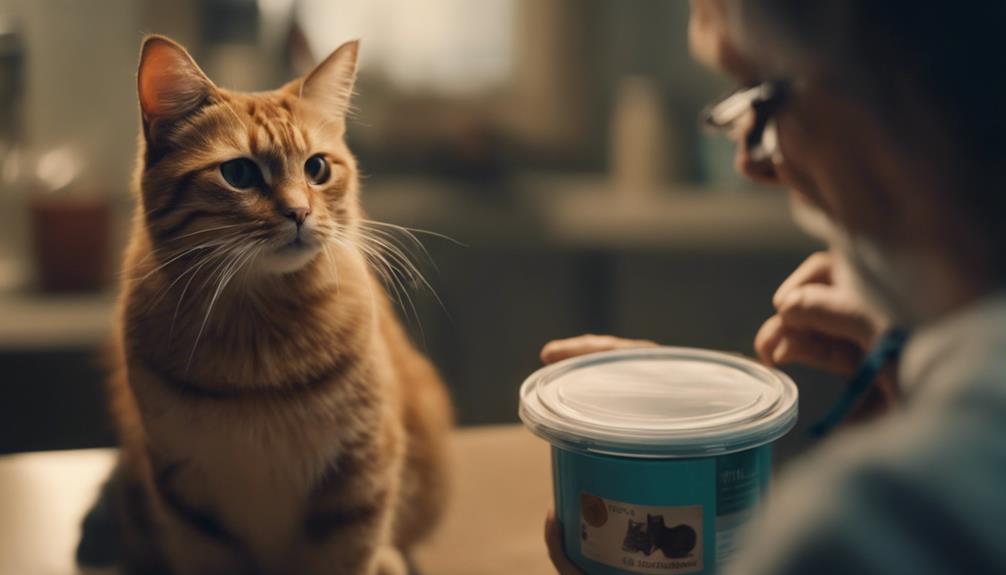
If a cat accidentally consumes cinnamon, prompt veterinary attention is crucial to mitigate potential risks and ensure the cat's well-being. Contact your veterinarian immediately for guidance.
It is essential to act swiftly to address any potential complications from cinnamon ingestion. Treatment may involve a thorough bathing to remove any cinnamon residue from the fur. Your veterinarian may recommend monitoring through blood work to assess the cat's health status. Providing fluids can help dilute any cinnamon consumed and aid in flushing it out of the system.
In cases where immediate veterinary care is unavailable, contact the Pet Poison Helpline or ASPCA Animal Poison Control Center for guidance on how to proceed. Swift action is key in safeguarding your cat's health in situations of cinnamon exposure.
Symptoms of Cinnamon Exposure
Cinnamon exposure in cats can manifest through a variety of symptoms that signal potential health concerns. These symptoms may include:
- Mouth Irritation: Cats might exhibit signs of mouth irritation such as drooling or pawing at the mouth after ingesting cinnamon.
- Gastrointestinal Distress: Cats may experience vomiting, diarrhea, or stomach upset after consuming cinnamon.
- Lethargy and Weakness: A cat exposed to cinnamon may appear lethargic, weak, or less active than usual.
If you notice any of these symptoms in your cat after potential cinnamon exposure, it is advisable to contact your veterinarian promptly for guidance on the best course of action.
Allergic Reactions to Cinnamon
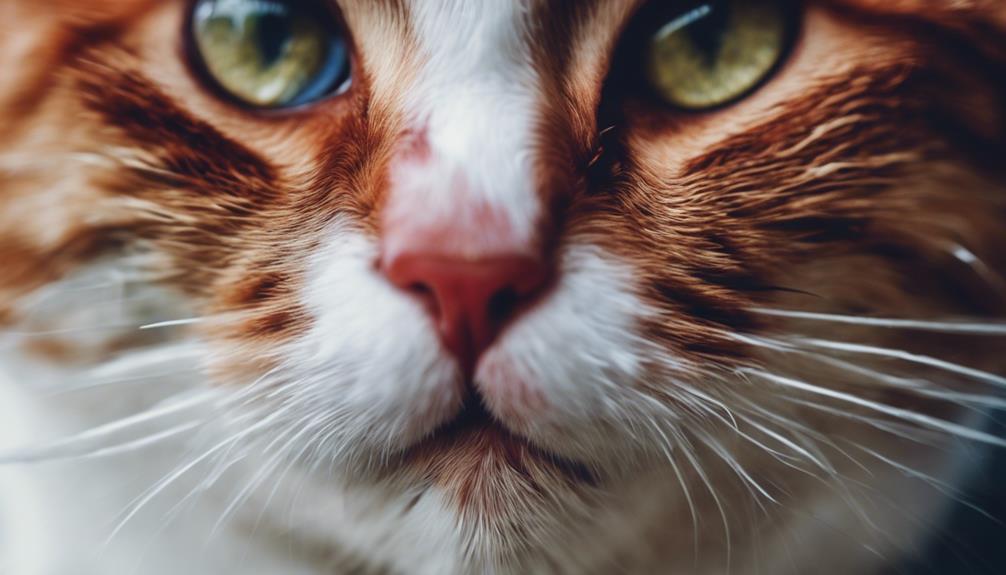
After exploring the symptoms of cinnamon exposure in cats, it is crucial to understand the potential risks associated with allergic reactions to this spice. Allergic reactions to cinnamon can manifest in cats as skin rashes, itchiness, hives, or scabbing of the skin. These reactions can occur with repeated exposures to cinnamon, indicating sensitivity to the spice.
It is essential for cat owners to be vigilant for any signs of allergic reactions if their feline friends come into contact with cinnamon. Monitoring for these symptoms can help in promptly addressing any adverse effects and seeking appropriate veterinary care if needed to ensure the well-being of the cat.
Safety Precautions for Cats
To ensure the well-being of cats, it is imperative for pet owners to implement appropriate safety measures concerning the presence of cinnamon in their surroundings.
Safety Precautions for Cats:
- Secure Storage: Store powdered cinnamon and cinnamon products out of reach of cats.
- Avoid Exposure: Keep cinnamon essential oils and concentrated forms away from cats to prevent ingestion.
- Monitor Interactions: Be cautious with cinnamon-scented items like candles and brooms, ensuring they are not accessible to cats to prevent potential mouth irritation.
Treatment for Cinnamon Ingestion
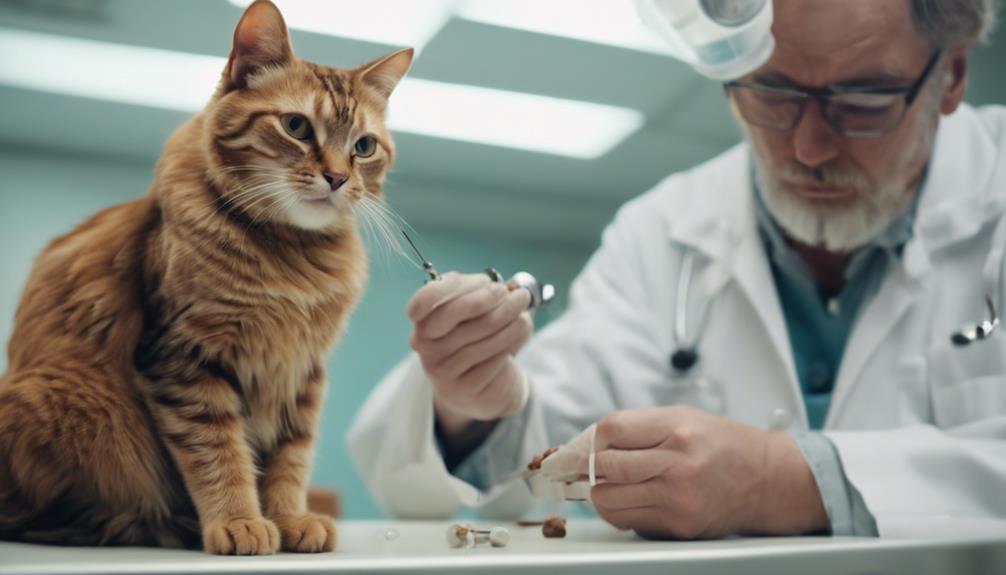
When a cat accidentally ingests cinnamon, prompt and appropriate treatment is essential to mitigate any potential adverse effects on their health. If you suspect your cat has ingested cinnamon, contact your veterinarian immediately.
Treatment may involve bathing your cat to remove any cinnamon residue from their fur and skin. Your vet may recommend monitoring your cat's blood work to check for any abnormalities. Providing fluids to dilute the ingested cinnamon may also be part of the treatment plan.
If you are unable to reach a veterinarian, contacting the Pet Poison Helpline or ASPCA Animal Poison Control Center for guidance is advisable. Quick action is crucial in ensuring the best possible outcome for your cat after cinnamon ingestion.
Importance of Quick Action
Prompt action is imperative to safeguard your cat's well-being in the event of cinnamon ingestion. Delayed response can escalate potential risks, necessitating a swift and informed approach. Here are key points to consider:
- Immediate Contact: Reach out to your veterinarian or a poison control center promptly.
- Bathing: Washing your cat to remove any cinnamon residue can help prevent further absorption.
- Monitoring: Keep a close eye on your cat for any unusual symptoms or behaviors post-ingestion.
Taking these steps promptly can significantly aid in mitigating any potential harm caused by cinnamon ingestion. Time is of the essence in ensuring your cat's safety and well-being.
General Guidelines for Cat Owners
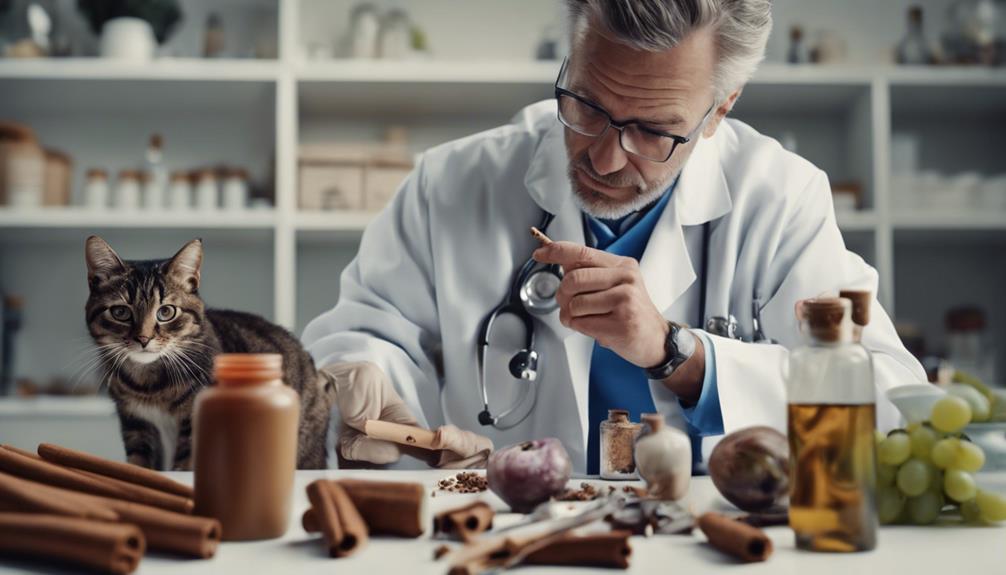
Cat owners should prioritize their feline companion's safety by adhering to essential guidelines for handling potential risks such as cinnamon exposure.
It is crucial to keep powdered cinnamon in small amounts and away from essential oils, which are concentrated and dangerous for cats. Avoid allowing cats to chew on cinnamon brooms or access cinnamon sticks and plants, as they can cause mouth irritation. Additionally, keep cinnamon candles out of reach.
Be vigilant for signs of cinnamon toxicity, including weakness, vomiting, and diarrhea, and seek veterinary help promptly if ingestion occurs. Remember that cats lack the enzyme to metabolize cinnamon, so prevention is key to their well-being.
Conclusion
In the intricate dance of feline care, understanding the dangers of cinnamon for cats is vital. Just as a vigilant guardian shields their charges from harm, cat owners must be vigilant in protecting their furry companions from the potential risks of cinnamon ingestion.
By arming themselves with knowledge and taking swift action when needed, cat owners can navigate the spice-laden path of pet care with grace and wisdom, ensuring their beloved felines remain safe and sound.




